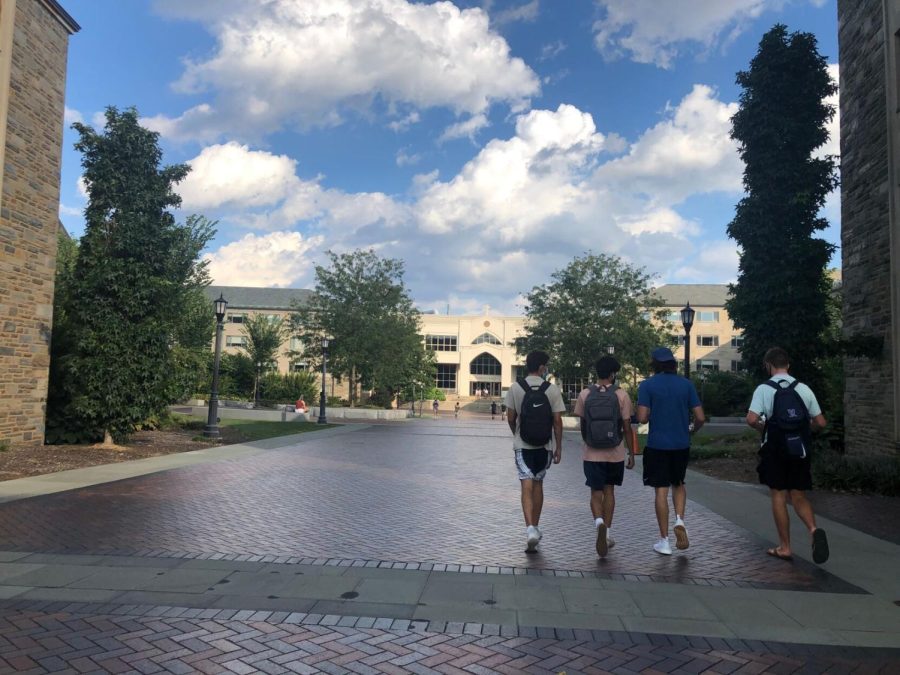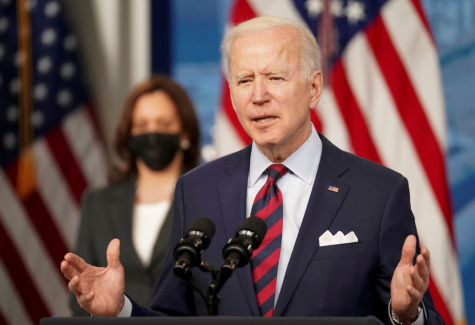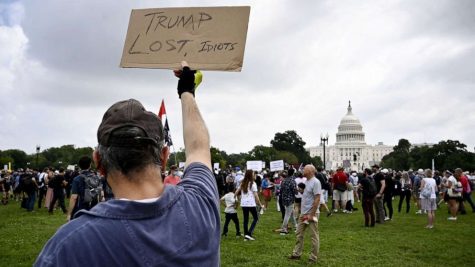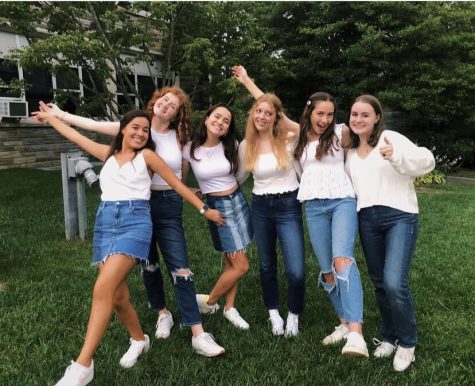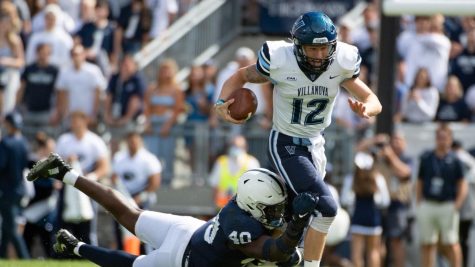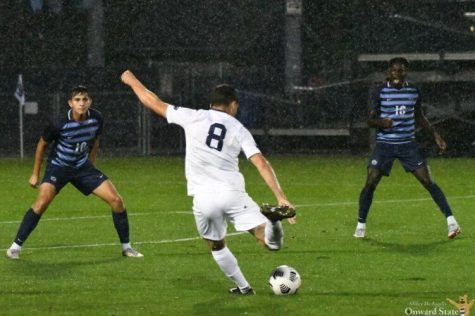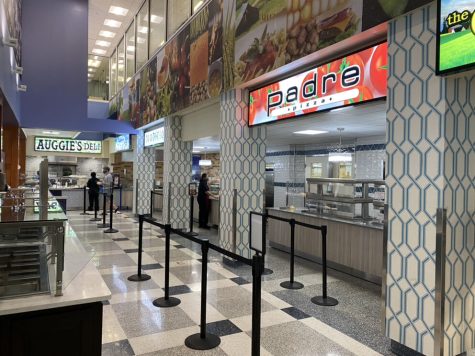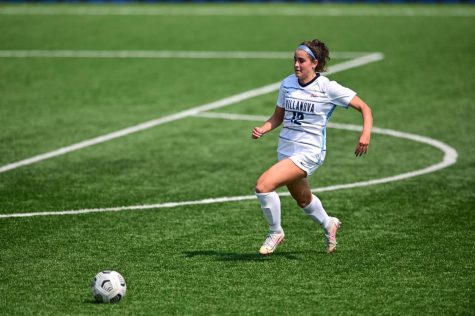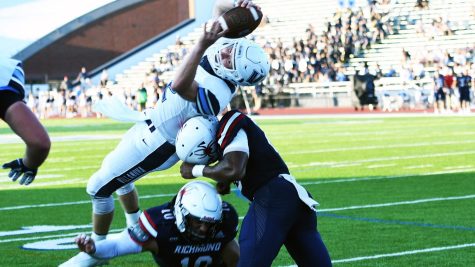University Prepares for Outcome of Presidential Election
Students walk to class in Bartley Hall.
November 4, 2020
As the nation has prepared for two seemingly different outcomes to this year’s presidential election, the University has also taken steps to encourage student voting and has developed programs to assist students and faculty for a variety of results in the days following the election.
Associate Vice President for Student Life Kathleen Byrnes, J.D. has been at the forefront of planning initiatives and developing programs to aid students and staff during this election cycle.
“Villanova engaged in a robust voter registration drive, targeted towards students, giving information about how to register in P.A. or how to access their home state voter information if they wished to register there,” Byrnes said.
Led by the University’s Student Government Association (SGA), #LetsVoteNova was a campaign launched to encourage voter participation. Teaming up with the Office of Student Involvement (OSI) and the Office of Student Life and the Office of Government and Community Relations, SGA not only helped students register throughout the semester but partnered with these offices to provide free shuttles from campus to various voting locations in the area. These shuttles ran every 30 minutes on Election Day.
“This campaign encouraged people to register and to vote,” Byrnes said. “It’s been very present on campus, and I believe most students are aware of the registration and voting drives.”
Most students currently attending the University were not on-campus when President Donald Trump won the election in 2016.
“In 2016, there was a lot of energy around the election,” Byrnes said. “2016 brought two main candidates, with the first woman to run on a major ticket and with the other candidate coming from outside the political process, i.e., never having run for any office of any kind prior to running for president.
Students and faculty four years ago felt some of the same emotions community members face today. Byrnes then reflected on the results and how it impacted the University, recalling both the excitement and surprise of the outcome.
“This year, in contrast, there seems to be greater anxiety around the election — COVID-19 consdierations make the prospect of in-person voting more complicated for many, and the political divisions in the country seem to have grown in recent times,” she said. “There’s also anxiety because anyone who understands election laws knows that all votes this year will not be counted by the end of the day on Nov. 3, and ballots cast on or before Nov. 3 will continue to be counted until all are counted. It could be days before we know who is the winner of the election.”
As students prepared for results, the University’s administration also created programs and events to explore topics and election issues leading up to Election Day. These were hosted by a variety of academic departments and political experts.
“For Election Day and the days following, we will have a heightened presence on campus to provide spaces for students to talk, to express and to find support as needed,” Byrnes said. “Campus Ministry, Health Promotion, Student Involvement, Diversity, Equity and Inclusion, Gender and Women’s Studies and the College of Liberal Arts and Sciences all have opportunities available for students to process the election and its impact on them.”
Offered pre- and post-Election Day, Listening Circles will be offered by the University for students to process thoughts and feelings.
“These offer the chance not to debate the issues but to create spaces for students to share their own perspectives and to listen respectfully to others’ sharing,” Byrnes said.
In continuation of the University’s Community First: The CARITAS Commitment, administrators have stressed the importance of the election as another opportunity for students, employees and faculty to put the community first.
“We are a diverse community, with diversity of thought and belief,” Vice President for Student Life Rev. John P. Stack, O.S.A. wrote in an email to the school community on Oct. 22. “Our diversity makes us stronger. We are also a community of respect, which means we respect differing viewpoints. Love of our neighbor is the value we hold most dear. Be respectful and kind to each other, whatever the outcome of the election may be.”
In the same spirit of Stack’s email, University President Rev. Peter M. Donohue, PhD, O.S.A. emailed the University community on the morning of Nov. 2.
“Although we may not always agree with one another or feel the same way about key issues, let’s promote good citizenship, be respectful, and remember that at the end of the day, we are all Villanovans,” Donohue wrote. “I ask that you please keep this in mind in the coming days and weeks, and that your words and actions be examples of the values that define us as Villanovans.”
According to Byrnes, University administrators have long been advocates for civic responsibility.
“We encourage all Villanovans to exercise their right to vote, a fundamental right of citizenship,” she said. “The election process is foundational to the democracy contemplated by the Constitution.”
She also echoed Stack and Donohue’s commitment to a community founded on love and respect in all things, including differing opinions and outlooks.
“Our diversity makes us stronger, our variations animate our life and conversations,” Byrnes said. “In all things we must care for one another, respect one another, be kind to one another. Some will be happy with the outcome of the election, some will not. That is inevitable. It will be important for each of us to respond in a way that shows Community First, that supports the common good, and that furthers our values of care, compassion, and respect for all. There will be no tolerance of people being disrespectful or hateful towards others.”
In the days following the outcome of the election, community members have resources available to them if they feel anxious, unsafe or unsure. Students are asked to call Public Safety or use the Anonymous Tips Feature in the Nova Safe application if they witness inappropriate actions and behavior.

